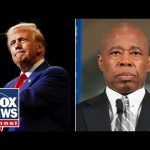Vice President J.D. Vance delivered a forceful message to world leaders at the Paris Artificial Intelligence Summit, signaling a significant shift in U.S. foreign policy under the Trump administration. Vance’s remarks emphasized America’s commitment to protecting its tech industry and free speech while challenging Europe’s increasingly restrictive regulatory frameworks, such as the Digital Services Act (DSA). The speech underscored the administration’s “America First” philosophy, prioritizing U.S. interests and technological leadership in an era of growing global competition.
Vance criticized European regulations for stifling innovation and imposing burdensome compliance costs on American tech companies. He argued that policies like the DSA, which aim to combat misinformation but often veer into censorship, threaten the principles of free expression. By drawing a sharp contrast between America’s hands-off approach and Europe’s regulatory overreach, Vance positioned the U.S. as a defender of innovation and individual freedoms. This stance resonated with conservatives who view free speech as a cornerstone of democracy and reject government interference in online discourse.
The Vice President’s remarks also highlighted the geopolitical stakes of artificial intelligence development. Vance warned against partnerships with authoritarian regimes like China, which he accused of weaponizing AI for surveillance and censorship. His call for Europe to align with the U.S. on AI governance rather than pursuing independent regulatory paths was both a challenge and an invitation. By framing AI as a battleground for ideological and economic dominance, Vance reinforced the administration’s commitment to maintaining America’s edge in this critical sector.
Defense Secretary Pete Hegseth echoed this assertive tone during parallel discussions with NATO allies, calling for increased European defense spending. Hegseth argued that the U.S. could no longer bear the disproportionate burden of securing Europe, urging NATO members to raise their defense budgets to 5% of GDP. This demand reflects long-standing conservative frustrations with European nations’ reliance on American military support while failing to meet their commitments. Hegseth’s remarks signaled a tough-love approach, emphasizing that true alliances require equitable contributions.
Critics have expressed concerns that these hardline stances could alienate allies or exacerbate global tensions. However, proponents argue that the Trump administration is simply correcting decades of imbalance in international relations. By prioritizing American interests and demanding fairness from allies, this strategy seeks to restore respect for U.S. leadership on the world stage. Conservatives view these moves as necessary recalibrations in an increasingly multipolar world where America must assert its values and protect its economic and security interests.
Ultimately, the Paris summit and related NATO discussions illustrate a broader realignment in U.S. foreign policy under Trump and Vance: one that unapologetically champions American exceptionalism while demanding accountability from partners. Whether this approach will yield lasting results remains to be seen, but it undeniably reflects a bold vision for America’s role in shaping global norms and defending its sovereignty in an era of rapid technological and geopolitical change.




